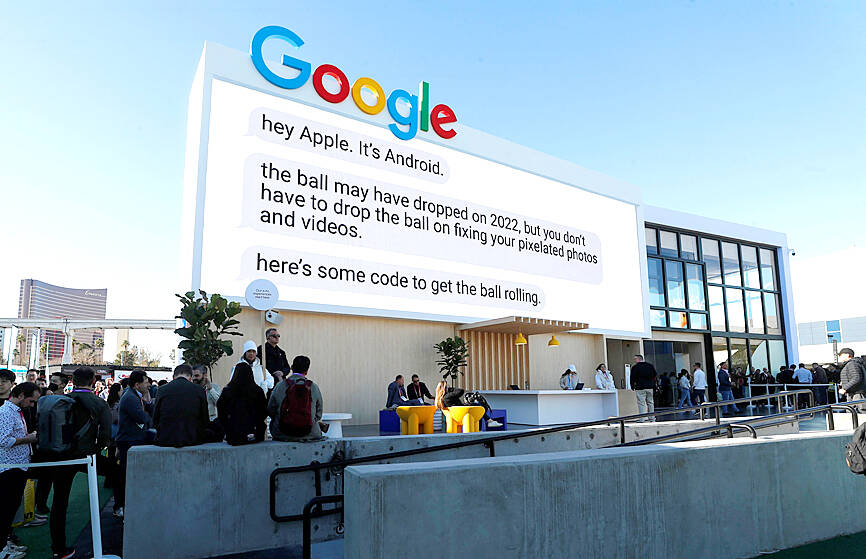The US Department of Justice (DOJ) on Tuesday accused Alphabet Inc’s Google of abusing its dominance in digital advertising, threatening to dismantle a key business at the heart of one of Silicon Valley’s most successful Internet firms.
The US government said Google should be forced to sell its ad manager suite, tackling a business that generated about 12 percent of Google’s revenues in 2021, but also plays a vital role in the search engine and cloud company’s overall sales.
“Google has used anticompetitive, exclusionary, and unlawful means to eliminate or severely diminish any threat to its dominance over digital advertising technologies,” the antitrust complaint said.

Photo: REUTERS
Google, whose advertising business accounts for about 80 percent of its revenue, said the government was “doubling down on a flawed argument that would slow innovation, raise advertising fees, and make it harder for thousands of small businesses and publishers to grow.”
The government has said its big tech investigations and lawsuits are aimed at leveling the playing field for smaller rivals to a group of powerful companies that includes Amazon.com Inc, Facebook owner Meta Platforms Inc and Apple Inc.
“By suing Google for monopolizing advertising technology, the DOJ today aims at the heart of the Internet giant’s power,” said Charlotte Slaiman, competition policy director at the Public Knowledge interest group. “The complaint lays out the many anticompetitive strategies from Google that have held our Internet ecosystem back.”
The lawsuit by US President Joe Biden’s administration follows a 2020 antitrust lawsuit brought against Google by the administration of then-US president Donald Trump.
The 2020 lawsuit alleged contraventions of antitrust laws in how the company acquires or maintains its dominance with its monopoly in online search and is scheduled to go to trial in September.
Eight US states joined Tuesday’s lawsuit, including Google’s home state of California.
California Attorney General Rob Bonta said that Google’s practices have “stifled creativity in a space where innovation is crucial.”
Colorado Attorney General Phil Weiser said that Google’s dominance had led to higher fees for advertisers and less money for publishers with ad space to offer.
“We are taking action by filing this lawsuit to unwind Google’s monopoly and restore competition to the digital advertising business,” he said in a statement.
In addition to its well-known search, which is free, Google makes revenue through its interlocking ad tech businesses.
The government asked for the divestiture of the Google Ad Manager suite, including Google’s ad exchange, AdX.
Google Ad Manager is a suite of tools, including one that enables Web sites to offer advertising space for sale and an exchange that serves a marketplace that automatically matches advertisers with those publishers.
Advertisers and Web site publishers have said that Google has not been transparent about where ad fees go, specifically how much goes to publishers and how much to Google.
The lawsuit raises concerns about certain products in the ad tech stack, where publishers and advertisers use Google’s tools to buy and sell ad space on other Web sites.
That business was about US$31.7 billion in 2021, or 12.3 percent of Google’s total revenue.
About 70 percent of that revenue went to publishers.

Stephen Garrett, a 27-year-old graduate student, always thought he would study in China, but first the country’s restrictive COVID-19 policies made it nearly impossible and now he has other concerns. The cost is one deterrent, but Garrett is more worried about restrictions on academic freedom and the personal risk of being stranded in China. He is not alone. Only about 700 American students are studying at Chinese universities, down from a peak of nearly 25,000 a decade ago, while there are nearly 300,000 Chinese students at US schools. Some young Americans are discouraged from investing their time in China by what they see

MAJOR DROP: CEO Tim Cook, who is visiting Hanoi, pledged the firm was committed to Vietnam after its smartphone shipments declined 9.6% annually in the first quarter Apple Inc yesterday said it would increase spending on suppliers in Vietnam, a key production hub, as CEO Tim Cook arrived in the country for a two-day visit. The iPhone maker announced the news in a statement on its Web site, but gave no details of how much it would spend or where the money would go. Cook is expected to meet programmers, content creators and students during his visit, online newspaper VnExpress reported. The visit comes as US President Joe Biden’s administration seeks to ramp up Vietnam’s role in the global tech supply chain to reduce the US’ dependence on China. Images on

New apartments in Taiwan’s major cities are getting smaller, while old apartments are increasingly occupied by older people, many of whom live alone, government data showed. The phenomenon has to do with sharpening unaffordable property prices and an aging population, property brokers said. Apartments with one bedroom that are two years old or older have gained a noticeable presence in the nation’s six special municipalities as well as Hsinchu county and city in the past five years, Evertrust Rehouse Co (永慶房產集團) found, citing data from the government’s real-price transaction platform. In Taipei, apartments with one bedroom accounted for 19 percent of deals last

US CONSCULTANT: The US Department of Commerce’s Ursula Burns is a rarely seen US government consultant to be put forward to sit on the board, nominated as an independent director Taiwan Semiconductor Manufacturing Co (TSMC, 台積電), the world’s largest contract chipmaker, yesterday nominated 10 candidates for its new board of directors, including Ursula Burns from the US Department of Commerce. It is rare that TSMC has nominated a US government consultant to sit on its board. Burns was nominated as one of seven independent directors. She is vice chair of the department’s Advisory Council on Supply Chain Competitiveness. Burns is to stand for election at TSMC’s annual shareholders’ meeting on June 4 along with the rest of the candidates. TSMC chairman Mark Liu (劉德音) was not on the list after in December last